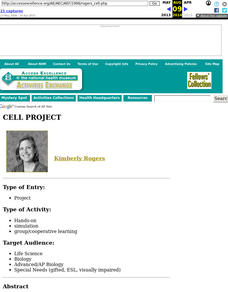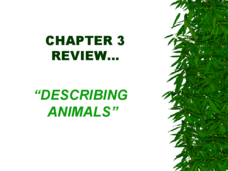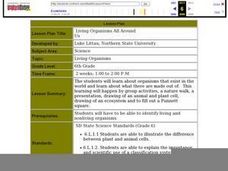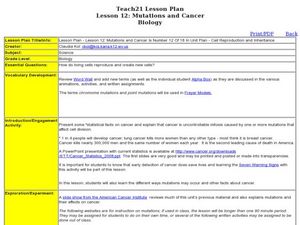Curated OER
Cell Project
Students investigate cells. They discover what cells are, where they are found, what they do and what they are made of. They construct a giant cell that is posted on the bulletin board.
Curated OER
Community Cell
Students explore parts and functions of the cell, and create models of assigned organelles.
Curated OER
Review of Cell Organelles
In this cell organelles instructional activity, students read the structure and function of different plant and animal cell organelles to determine what organelle is being described. Students write in the 15 organelles into a chart.
Pennsylvania Department of Education
Animal Classes and Their Ecosystems
Students explore animal characteristics by participating in an environment identification activity. In this animal habitat instructional activity, students discuss a range of different wild life and the ecosystems that they are a part...
Curated OER
Regents High School Exam: Living Environment 2008
Tne New York Regents High School Examinations are comprehensive and include various styles of questions, includingmultiple choice and the analysis of graphs. This particular version, the 2008 Living Environment exam surveys a variety of...
Curated OER
Neurons and the Nervous System
The highlight of this series is activitiy #4. Anatomy pupils examine slides of three unknown cells. With the function of the nervous system in mind, they consider the structure of each and try to guess which one is part of that system....
Curated OER
Lesson 2: the Cell Cycle
Students explain how cells reproduce. In this biology lesson, students explain the different stages of the cell cycle. They calculate the number of new cells produced.
Curated OER
Cells: Nature's Building Blocks
What you will find on this page is the general outline of a unit on the use of a microscope and the structure of the cell. There is no actual educational content here, so you will need to design the details of each of the four student...
Curated OER
The Structure and Function of Cells: Making Biology Fun
Investigate life below a microscope, and cells and discover the differences between plant and animal cells.
Biology Junction
Cellular Structure
The human body contains more than 200 types of cells, and plants contain many other unique types of cells. While a huge variety of cells exist, they appear to have very similar structures. A detailed presentation describes the structure...
Curated OER
Cells: Structures and Processes
Students explore the basic unit of life, the cell in this nine lessons unit. The cell structure of animal and plant cell functions and how they affect our world are probed in this unit.
Howard Hughes Medical Institute
The Proteasome and Protein Regulation
What is a proteasome? Like tiny trash compactors inside cells, proteasomes turn worn-out proteins into reusable amino acids! Explore the topic with a presentation and embedded simulations. The resource includes a teacher's reference and...
Curated OER
Animal Diseases
Many of the toxins and parasites that cause illness are specified and discussed in this slideshow. Poisoning and other mechanisms by which an animal can fall ill are detailed and the information about frequency, prevention and...
Curated OER
Cross-Section of an Animal Cell
A scanned copy of a diagram of the animal cell is what you will find on this worksheet. Learners label organelles on the lines provided. Unfortunately, the figure and font are somewhat fuzzy.
Curated OER
Describing Animals
While a short review of animals and their classifications, this could be useful when discussing this topic in the classroom. There is a list of questions at the end to help review the main ideas. Reptiles, amphibians, and mammals are...
Pace University
Grade 6-8 Living Things
What characterizes a living thing? Scholars explore the concept during a differentiated instruction unit on living things. They perform lab experiments to determine how animals adapt to stimuli, watch videos and learn about...
Curated OER
Living Organisms All Around Us
Sixth graders study organisms that exist in the world and what they are made up of. They participate in a nature walk, a presentation, a drawing of an animal and plant cell, draw a ecosystem, and fill out a Punnett square.
National Nanotechnology Infrastructure Network
Biology Reference Sheet
First year life science or biology pupils will appreciate this all-inclusive reference page. It provides a diagram of both a plant and an animal cell, the metric system prefixes, classification levels, definitions for cell processes, the...
Curated OER
Membranes
Biology pupils take the cell membrane apart piece-by-piece as they complete this worksheet. They describe the structure of the cell membrane and explain the processes that transport materials across it. This phenomenal resource even has...
Curated OER
Mutations and Cancer
High schoolers study how cancer cells mutate and affect cell division. In this investigative lesson students view a PowerPoint presentation learn the seven warning signs of cancer.
Curated OER
The Great Animal Systems Challenge!
Advanced placement biology aces list systems that have evolved over time, adaptations, and structure-function relationships. The resource requires plenty of writing to answer these questions, so allow a few days for them to complete the...
Curated OER
Sunken Millions Animals
This PowerPoint includes a game with ocean graphics in which two teams answer increasingly difficult questions about animals. Topics covered include plant and animal cells, animal adaptation, and similarities and differences between...
Curated OER
Animation Flip Books
Students investigate examples of animation made from a flipbook technique in order to learn how to create their own flipbook and to learn how this process looks like an animated cartoon. In this animation lesson plan, students will...
Virginia Department of Education
Animal Phyla and Plant Divisions
Searched hours for an activity that allows individuals the ability to use multiple resources to learn about both plant and animal kingdoms? This discussion and activity provide pupils with the ability to visualize each organism...























